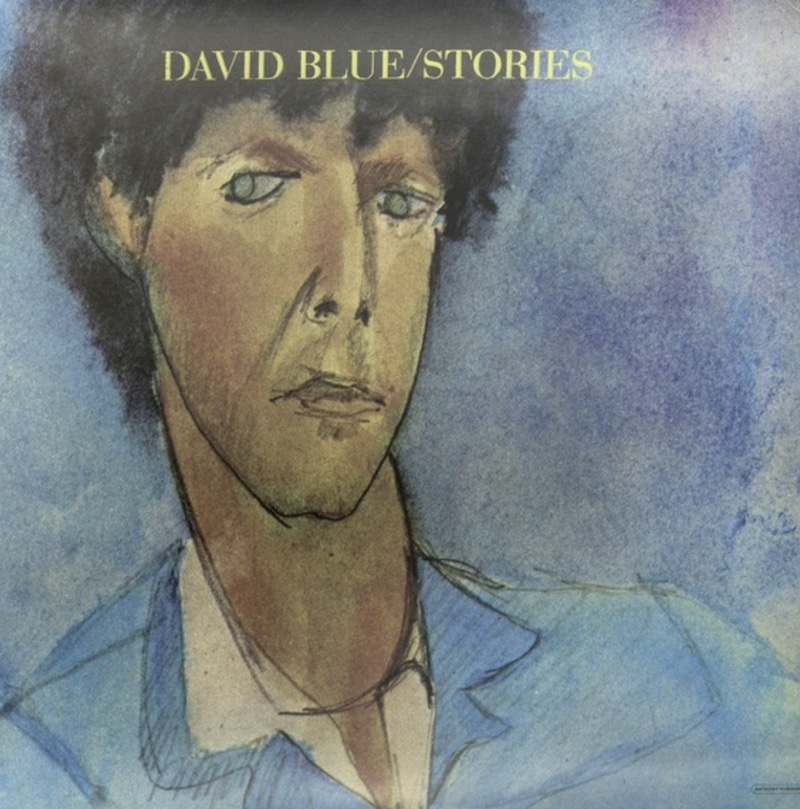David Blue's "Stories" Tells Mournful Tales Not as Sad as the Singer/Songwriter's Own
Gets an AAA Limited Edition Reissue
There was a time when you could buy a label's output and be confident you'd made a quality record purchase without hearing the music. Labels that managed this late '60s/early '70's feat included Elektra, Warner Brothers/Reprise, Island and David Geffen's Asylum Records.
You could buy with confidence Love's debut, The Doors, Jackson Browne's Saturate Before Using, Traffic's Mr. Fantasy, Cat Stevens' Mona Bone Jakon, for example, even if you knew nothing about the artist. Buying Asylum's output was easier: artists like Joni Mitchell had already established themselves. Even a "new act" like The Eagles had members with a known background working as part of Linda Ronstadt's band.
David Blue's Asylum debut Stories issued in 1972 should have been a "no-brainer" for many record buyers who purchased "by label" (and there were many who did) but somehow the album did not sell well. it wasn't Blue's first album, any more than Mona Bone Jakon was Cat Stevens' first album. Both had previous, unsuccessful, unfocused albums. Blue had released a 1966 eponymous album on Elektra, and two later releases on Reprise (one issued under his real name S. David Cohen), neither of which was successful. Following Stories Blue issued three additional Asylum albums.
None of Blue's albums brought him the success achieved by his friends from either the East Coast folk scene he shared with Bob Dylan, Phil Ochs, Eric Anderson and others, or the later California one where he was friends of Joni, Jackson and The Eagles, which covered his song "Outlaw Man" that had been the lead song on his 1973 Asylum album Nice Baby and the Angel.
Blue is on the cover of The Band's Basement Tapes album and toured with the Rolling Thunder Review, and he later found work as an actor and seemed to have finally found success in theater and films while continuing to perform as a singer/songwriter.
The story has the expected sad ending. Blue died suddenly, December of 1982, of a heart attack at age 41 while jogging in Washington Square Park, Greenwich Village. One of Blue's friends, Leonard Cohen, wrote a touching elegy that's included in a full sized one-sheet; a photo on the other side is of the two together taken around 1980.
Cohen's piece begins straightforward with "He died running, he fell beside the square, to the street where, many years before he hd begun to sing, he fell in the fullest expression of vanity & discipline." Cohen intimates that Blue and Joni had been an early item mentioned obliquely in song and that Kris Kristofferson has referenced him as well. Mitchell introduced Blue to Elliot Roberts and David Geffen. Blue hired future Eagle Don Felder for his back-up band, auditioning him in Joni's apartment.
Cohen goes on to say that Blue was "...the peer of any singer in this country, & he knew it., & he coveted their audiences & their power, he claimed them as his rightful due. & when he could not have them, his disappointment become so dazzling, his greed assumed such purity....." you'll have to read the rest yourself, though this reissue is limited to 1000 copies so if you are interested....
I remember passing on this record when it was released though i regularly bought what Asylum issued. There were names on the back cover that are more familiar now and had I known them then there's no way I'd have missed this record. Russ Kunkel, Ry Cooder, Milt Holland, Chris Ethridge, Rita Coolidge and Jack Nitzsche are among the musicians credited. The album was produced and engineered by Henry Lewy. Henry Diltz took the Lou Reed-ish looking back cover photo. Anthony Hudson drew the angular portrait of Blue in blue on the cover (along with covers for Neil, Joni, et.al). You probably know his son Saul a/k/a "Slash".
A sad story with fame all around him but none to spare and a sad story album filled with same. The opening line of the first song "Looking for a Friend" is "I never really had a friend of my own, I had a woman once, I thought we were close, That was then...." Need more be divulged for you to know where this one's going? Well one more thing: there's a song called "Marianne" and it's that Marianne.
There's a song about a junkie and one about a failed conquest and surely by now you get the picture. Blue on guitar, piano and darkly hewn vocals is closely miked and right there in your room getting the best Henry Lewy singer-songwriter sonic treatment. By all means think Leonard Cohen, maybe Tom Rush and definitely Townes Van Zandt (among others) and you'll get the musical picture though if you get one of the 1000 copies you'll get David Blue.
Kevin Gray cut from the original master tapes and the pressing, from wherever, was quiet and well-done in every way. The jacket is odd: it's a "fold-over" and not of Stoughton Press or Dorado or some of the other top jacket manufacturer quality, but that's a minor consideration.
There's a song on the album called "Sister Rose" and the reissue was produced for Sister Rose by Michael Ehlers, clearly a fan and a man on a mission. David Blue had a friend after all. He had many friends. Order directly from Eremite Records









































.png)








